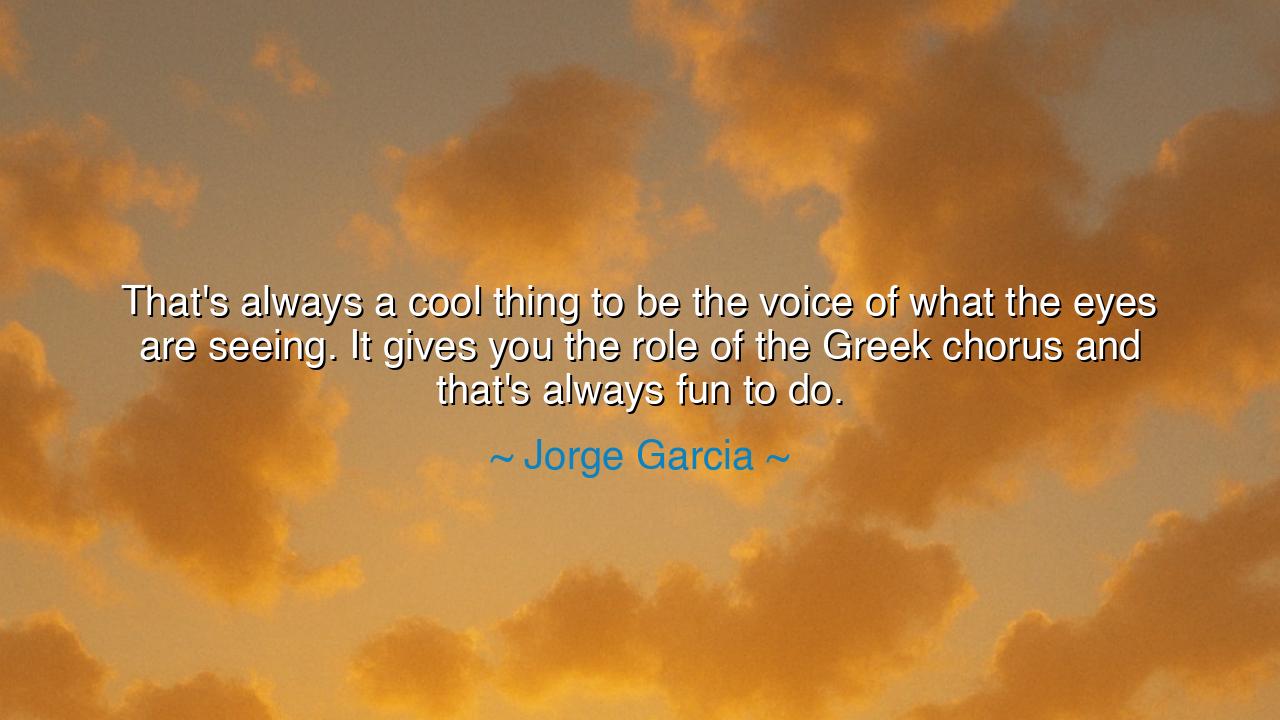
That's always a cool thing to be the voice of what the eyes are
That's always a cool thing to be the voice of what the eyes are seeing. It gives you the role of the Greek chorus and that's always fun to do.






In the vast theater of life, where every soul plays their part, there are those who hold the sacred role of the observer—the ones who stand apart yet comment on the actions, guiding the audience toward deeper understanding. Jorge Garcia speaks of this role with clarity and excitement: “That’s always a cool thing to be the voice of what the eyes are seeing. It gives you the role of the Greek chorus and that’s always fun to do.” In these words, Garcia alludes to an ancient tradition, the role of the chorus in Greek drama, a group whose task was to narrate and comment on the events unfolding before the audience. It was a role that offered both insight and perspective, bringing the unseen and unspoken into the light. The chorus was the voice of truth, often offering wisdom, guidance, and reflection on the events that transpired, allowing the audience to see the full depth of the story.
The Greek chorus, found in works like those of Sophocles and Aeschylus, was integral to the theatrical experience. It was not simply a group of voices filling the air, but a powerful tool to interpret the actions and emotions of the characters. The chorus had the unique power to shape how the audience understood the play, providing commentary on the moral and emotional weight of the events. The chorus was the bridge between the stage and the audience, guiding the listener’s emotions and thoughts through song, poetry, and spoken word. In this way, the chorus was both a witness and a participant in the unfolding drama, allowing the audience to reflect on the events, much like the observer in our own lives.
To be the voice of what the eyes are seeing is a powerful position, for it grants one the ability to not only witness but to shape the perception of others. Garcia’s comparison to the Greek chorus brings to mind the power of storytelling itself—the ability to interpret and reframe the narrative, to offer a new lens through which the audience can understand the world. The ancient storytellers, from Homer in his epic tales of Odysseus to the early tribal narrators, knew the weight of their words. They were the keepers of knowledge, the ones who shaped how history would be remembered. The storyteller’s role was to take the raw material of experience and craft it into a meaningful narrative, guiding the listener through the moral and emotional depths of the tale.
Consider the example of Homer, whose epic poems, the Iliad and the Odyssey, have shaped the way we think about heroism, fate, and the human condition. Homer’s voice is the voice of the Greek chorus, guiding us through the great events of the Trojan War, reflecting on the nature of pride, loss, and the inevitability of death. But Homer also does something more: he gives us the voice of the gods, who observe and comment on the actions of men, shaping the destiny of heroes. In the same way, Garcia’s voice, as the observer, holds the power to guide the audience’s understanding of events, adding layers of meaning and reflection. It is a role that demands both insight and wisdom, for to be the observer is not merely to witness, but to interpret, to guide, and to give meaning to the events unfolding.
The role of the Greek chorus was not one of passive observation but active engagement. The chorus was often the moral center of the play, calling out truths that the characters themselves might not see or choose to ignore. In the same way, the role of the observer in life can sometimes be to offer a counterpoint to the noise around us. It is to stand back, to see the bigger picture, and to offer insight that others might not have. Whether in art, in communication, or in daily life, we all have the opportunity to step into this role—the role of the observer, the voice that helps others see beyond their immediate concerns, offering clarity and reflection.
The lesson to be drawn from Garcia’s words is clear: there is great power in observation, in being the one who comments on the unfolding drama of life. We must learn to embrace the role of the Greek chorus—not just in the grand narratives of history but in the small moments of our own lives. The art of interpretation, of stepping back and seeing the broader truth, is something we can all practice. By doing so, we gain a deeper understanding of our own roles in the world and can offer wisdom, clarity, and insight to those around us.
So let us be the voices of wisdom in our own lives, stepping into the role of the observer with purpose and insight. Let us reflect on the events around us, not merely as passive witnesses, but as active interpreters, guiding ourselves and others through the unfolding drama of existence. Like the Greek chorus, we have the power to offer truth, to interpret what we see, and to shape the understanding of those who listen. And in doing so, we fulfill the noble role of both witness and guide—leading others through the complexity of life with insight, reflection, and wisdom.






AAdministratorAdministrator
Welcome, honored guests. Please leave a comment, we will respond soon